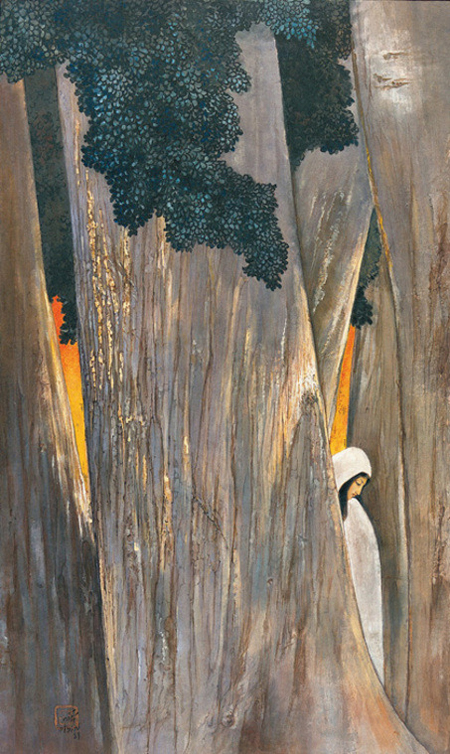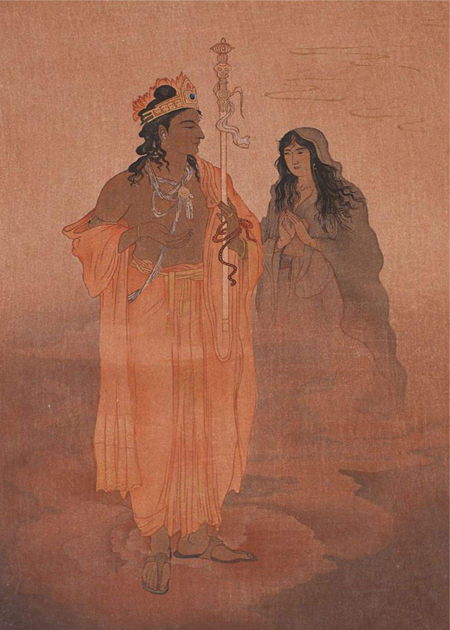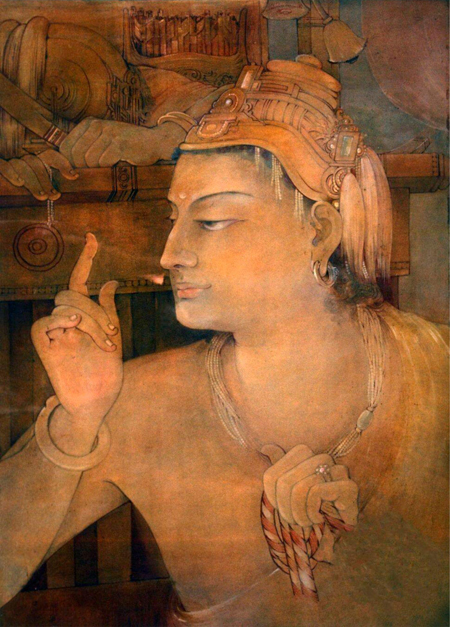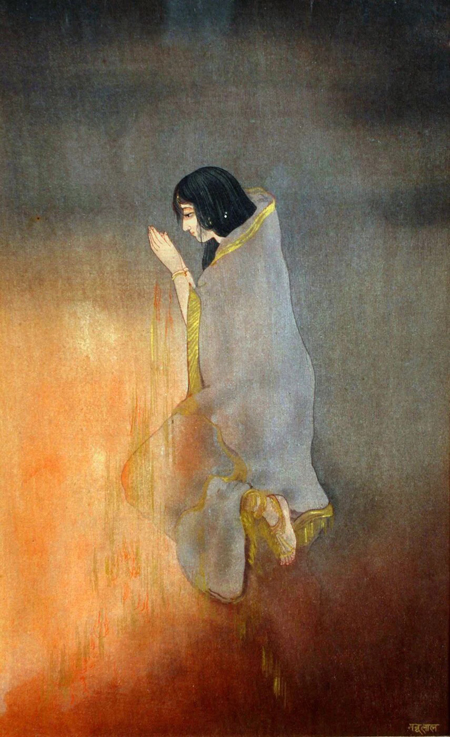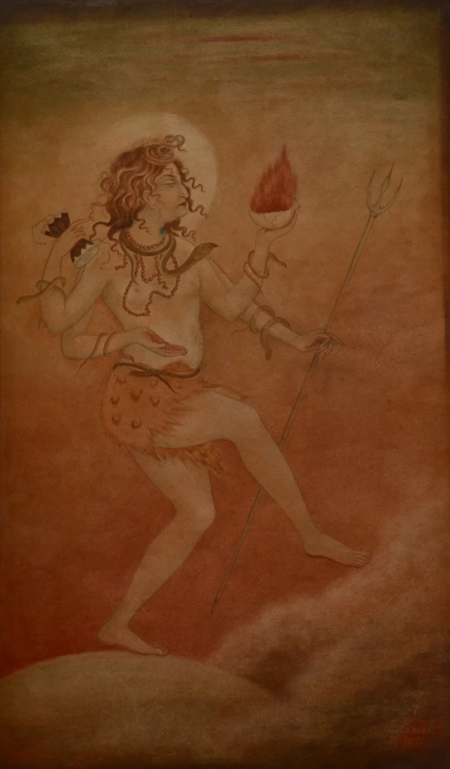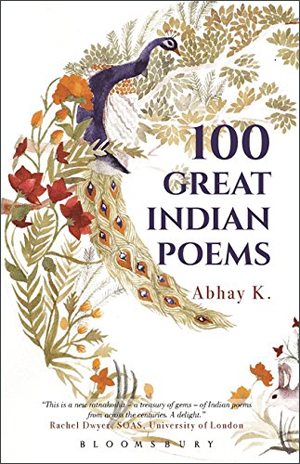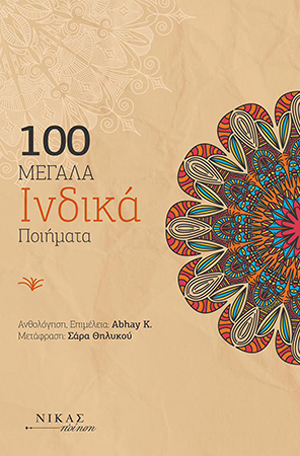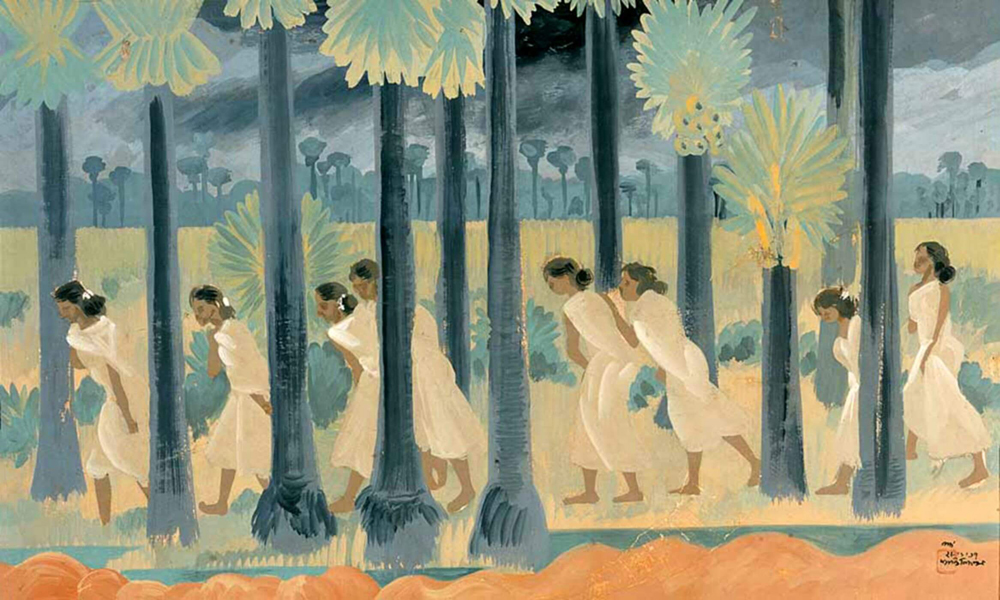
A treasury of gems
On 10th December 1950, William Faulkner began his Nobel Prize acceptance speech with these words: ‘I feel that this award was not made to me as a man, but to my work—a life’s work in the agony and sweat of the human spirit, not for glory and least of all for profit …’
As art transcends the artist, poetry transcends the poet. He continues: ‘If I had not existed, someone else would have written me, Hemingway, Dostoyevsky, all of us. Proof of that is that there are about three candidates for the authorship of Shakespeare’s plays. But what is important is Hamlet and A Midsummer Night’s Dream, not who wrote them, but that somebody did. The artist is of no importance. Only what he creates is important, since there is nothing new to be said.’
—Abhay K., 100 Great Indian Poems
ABHAY K. is an Indian diplomat, poet, editor, translator and the author of several poetry collections including Celestial, Stray Poems, Monsoon, The Magic of Madagascar, The Alphabets of Latin America. His poem “Earth Anthem” has been translated into over 150 languages. He received the SAARC Literary Award 2013 and was invited to record his poems at the Library of Congress, Washington DC in 2018. His translation of Kalidasa’s Meghaduta and Ritusamhara from Sanskrit have received the KLF Poetry Book of the Year Award 2020-21.
Dr Sarah Thilykou, poet, translator, essayist, critic, editor and founding member of PEN Greece, was born in Thessaloniki, Greece, where she studied theology, drama, and music, with further work in Utrecht, Paris and Athens. She has published six poetic collections, including Duet of Islands. Her poems have been translated into many languages, in international anthologies and journals. She has translated, among others, Gabriel Rosenstock (The Floating Universe, Silver Birches, Angelic Flights, Stirrings of Love), Rua Breathnach (The City Next Door) and Allen Ginsberg (Buddha Died).
This week’s post on The Culturium offers a collaboration between these two accomplished artists. Drawing inspiration from his Asian heritage, Abhay K. has compiled an anthology of verse, 100 Great Indian Poems, which itself forms the inspiration for Sarah’s own Greek translation, 100 Μεγάλα Ινδικά Ποιήματα, serving as a literary bridge between the great cultures of India and Greece.
Epitaph on My Gravestone
Manushya Puthiran
Translated from Tamil by C.S. Lakshmi and Arundhati Subramaniam
There is
no one here.
You may go.
Epitaph on my Gravestone
Επίγραμμα στον τάφο μου
Manushya Puthiran
Μετάφραση από Τάμιλ: C.S. Lakshmi και Arundhati Subramaniam
Δεν υπάρχει
κανείς εδώ.
Μπορείς να φύγεις.
Friend, this is the only way
Sachal Sarmast
Translated from Sindhi by Ivan M. Granger
Friend, this is the only way
to learn the secret way:
Ignore the paths of others,
even the saints’ steep trails.
Don’t follow.
Don’t journey at all.
Rip the veil from your face.
Friend, this is the only way
Φίλε, αυτός είναι ο μόνος τρόπος
Sachal Sarmast
Mετάφραση από Σίντι: Ivan M. Granger
Φίλε, αυτός είναι ο μόνος τρόπος
να μάθεις τον μυστικό δρόμο:
Αγνόησε τις ατραπούς των άλλων,
ώς και των αγίων τα απόκρημνα μονοπάτια.
Μην ακολουθείς.
Μην ταξιδεύεις καθόλου.
Σχίσε το πέπλο απ’ το πρόσωπό σου.
How to Go To the Tao Temple
K. Satchidanandan
Translated from Malayalam by the poet
Don’t lock the door.
Go lightly like the leaf in the breeze
along the dawn’s valley.
If you are too fair,
cover yourself with ash.
If too clever, go half-asleep.
That which is fast
will tire fast:
be slow, slow as stillness.
Be formless like water.
Lie low, don’t even try to go up.
Don’t go round the deity:
nothingness has no directions,
no front nor back.
Don’t call it by name,
its name has no name.
No offerings: empty pots
are easier to carry than full ones.
No prayers too: desires
have no place here.
Speak silently, if speak you must:
like the rock speaking to the trees
and leaves to flowers.
Silence is the sweetest of voices
and Nothingness has
the fairest of colours.
Let none see you coming
and none, going.
Cross the threshold shrunken
like one crossing a river in winter.
You have only a moment here
like the melting snow.
No pride: you are not even formed.
No anger: not even dust
is at your command.
No sorrow: it doesn’t alter anything.
Renounce greatness:
there is no other way to be great.
Don’t ever use your hands:
They are contemplating
not love, but violence.
Let the fish lie in its water
and the fruit, on its bough.
The soft one shall survive the hard,
like the tongue that survives teeth.
Only the one who does nothing
can do everything.
Go, the unmade idol
awaits you.
How to go to the Tao Temple
Πώς να πας στον ναό του Τάο
K. Satchidanandan
Μετάφραση από Μαλαγιάλαμ από τον ποιητή
Mην κλειδώσεις την πόρτα.
Kινήσου ελαφρά σαν φύλλο στην αύρα
πέρα στην κοιλάδα της αυγής.
Αν είσαι πολύ όμορφος,
καλύψου με στάχτη.
Αν έξυπνος πολύ, πήγαινε μισοκοιμισμένος.
Αυτό που είναι γρήγορο
θα κουραστεί γρήγορα:
να είσαι αργός, αργός σαν τη γαλήνη.
Σαν το νερό να είσαι, χωρίς σχήμα.
Μείνε χαμηλά, μην προσπαθήσεις καν να ανέβεις.
Μην περικυκλώνεις τη θεότητα:
το κενό δεν έχει κατευθύνσεις,
μπροστά ή πίσω.
Μην την καλείς με όνομα,
το όνομά της δεν έχει όνομα.
Καμία προσφορά: τα άδεια δοχεία
πιο εύκολα τα μεταφέρεις από τα γεμάτα.
Καμία προσευχή επίσης: oι επιθυμίες
δεν έχουν θέση εδώ.
Μίλα σιγά, αν πρέπει να μιλήσεις:
όπως η πέτρα ομιλεί στα δέντρα
και τα φύλλα στα λουλούδια.
Η σιωπή είναι η πιο γλυκιά φωνή
και το Κενό έχει
το πιο ωραίο χρώμα.
Κανείς να μην σε δει να έρχεσαι
κανείς να φεύγεις.
Πέρνα το κατώφλι μαζεμένος
όπως περνά κανείς ποτάμι τον χειμώνα.
Έχεις μονάχα ένα λεπτό εδώ
όπως το χιόνι που λιώνει.
Καμία υπερηφάνεια: δεν έχεις καν σχήμα.
Κανένας θυμός: oύτε καν η σκόνη
δεν βρίσκεται στις διαταγές σου.
Καμία θλίψη: τίποτε αυτή δεν αλλάζει.
Αποκήρυξε το μεγαλείο:
είναι ο μόνος τρόπος να είσαι μεγάλος.
Μην χρησιμοποιείς τόσο τα χέρια:
Απεργάζονται
όχι την αγάπη, αλλά τη βία.
Άσε το ψάρι στο νερό του
και τον καρπό, στο κλαδί του.
Το μαλακό θα ζήσει πιο πολύ από το σκληρό
όπως η γλώσσα ζει πιο πολύ απ’ τα δόντια.
Μόνον αυτός που τίποτε δεν κάνει
μπορεί να κάνει τα πάντα.
Πήγαινε, το άκτιστο είδωλο
σε περιμένει.
Black Bag
Pavankumar Jain
Translated from Gujarati by Arvind Krishna Mehrotra
I have a desire
To put an end to my life,
But not today,
There’s nothing special
About today.
Moreover,
I have two glass bottles to clean,
A haircut to get,
My cataracts operated,
Plants to water
(They’re flowering at the moment),
A younger sister to look after.
And I haven’t stopped dreaming of the stranger
Who’ll leave me his millions.
For now I’ll put
The talk of death
In my tattered black shopping bag
Full of holes
And hang it from a nail
In the wall.
To be honest,
I’d like to become a sadhu.
But it’ll be years before I can bring
Any sort of order to the chaos
That surrounds me.
There’s also the awkwardness
Of moving around in a loincloth,
Begging for alms.
That’s one thing.
Then, there are the mothers
Who’ll want to scare their little ones
By pointing at us:
There goes a sadhu.
He’s come to catch you.
It’s not easy to get used to all this.
Best that I put this away too
In my tattered black shopping bag
Full of holes
And hang it from a nail
In the wall.
Black Bag
Μαύρη τσάντα
Pavankumar Jain
Μετάφραση από Γκουτζαράτι: Arvind Krishna Mehrotra
Έχω μια επιθυμία
Να βάλω ένα τέλος στη ζωή μου,
Όμως όχι σήμερα,
Δεν υπάρχει κάτι το ιδιαίτερο
Σήμερα.
Επιπλέον έχω,
Δυο γυάλινα μπουκάλια να καθαρίσω,
Να κάνω ένα κούρεμα,
Μια επέμβαση καταρράκτη,
Φυτά να ποτίσω
-Ανθίζουν τώρα-,
Μία μικρότερη αδελφή να φροντίσω,
Και δεν έχω πάψει να ονειρεύομαι τον ξένο
Που θα μου αφήσει τα εκατομμύριά του.
Για την ώρα θα αφήσω
Την κουβέντα του θανάτου
Στην μαύρη μου κουρελιασμένη τσάντα για τα ψώνια
Γεμάτη τρύπες
Και θα την κρεμάσω σε ένα καρφί
Στον τοίχο.
Για να είμαι ειλικρινής
Θα ήθελα να γίνω ασκητής.
Αλλά θα πάρει χρόνια για να φέρω
Μια κάποια τάξη μες στο χάος
Που με περιβάλλει.
Είναι επίσης άβολο
Να περιφέρομαι με ένα λινό περίζωμα
Ζητώντας ελεημοσύνη.
Αυτό είναι πρώτα από όλα.
Έπειτα είναι οι μανάδες
Που θέλουν να τρομάξουν τα μικρά τους
Δείχνοντας με το δάχτυλο:
Eκεί είναι ένας ασκητής.
Έρχεται να σας πιάσει.
Δεν είν’ εύκολο να το συνηθίσεις όλο αυτό.
Καλύτερα κι αυτό να το τακτοποιήσω
Στην μαύρη μου κουρελιασμένη τσάντα για τα ψώνια
Γεμάτη τρύπες
Και να την κρεμάσω σε ένα καρφί
Στον τοίχο.
People
Tukaram
Transcreation from Marathi by Gabriel Rosenstock
The deception was eating into me
so I started calling my dog “God’”
He thought it was a bit loony
at first,
then he started to laugh, and even
danced a bit of a jig.
“Here God!”—he doesn’t bite
any more. Now,
I wonder would
this work
with people?
People
Άνθρωποι
Tukaram
Μετάφραση: Gabriel Rosenstock
H απάτη έτρωγε τα σωθικά μου
έτσι άρχισα να λέω τον σκύλο μου «Θεό».
Σκέφτηκε ότι ήταν λίγο τρελό
στην αρχή,
μετά άρχισε να γελά, κι ακόμη
να χοροπηδά.
«Εδώ Θεέ!» – δεν δαγκώνει
άλλο πια. Τώρα
αναρωτιέμαι μήπως
αυτό δουλεύει
με τους ανθρώπους;
Post Notes
- Feature image: Nandalal Bose, New Clouds, Fair Use
- Abhay K.’s website
- Abhay K.: Anthems for Immortality
- Abhay K.: Shunyata
- Poeticanet
- Beltway Poetry
- Japan Universal Poets Association
- PEN Greece
- Nadwah
- Debiprasad Mukherjee, Gabriel Rosenstock & Sarah Thilykou: Last Stop Before Salvation
- Upahar: Bright Like a Million Suns
- Rabindranath Tagore: Gitanjali
- Debiprasad Mukherjee, Gabriel Rosenstock & Sarah Thilykou: Last Stop Before Salvation
- Krishnamurti’s Notebook
- Liam Ó Muirthile: Camino de Santiago, Dánta, Poems, Poemas
- Masood Hussain & Gabriel Rosenstock: Love Letter to Kashmir
- The Culturium uses affiliate marketing links via the Amazon Associates Programme
